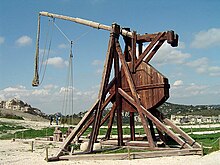Overview

There are various types of potential energy, each associated with a particular type of force. For example, the work of an elastic force is called elastic potential energy; work of the gravitational force is called gravitational potential energy; work of the Coulomb force is called electric potential energy; work of the strong nuclear force or weak nuclear force acting on the baryon charge is called nuclear potential energy; work of intermolecular forces is called intermolecular potential energy. Chemical potential energy, such as the energy stored in fossil fuels, is the work of the Coulomb force during rearrangement of configurations of electrons and nuclei in atoms and molecules. Thermal energy usually has two components: the kinetic energy of random motions of particles and the potential energy of their configuration.
Forces derivable from a potential are also called conservative forces. The work done by a conservative force is
where is the change in the potential energy associated with the force. The negative sign provides the convention that work done against a force field increases potential energy, while work done by the force field decreases potential energy. Common notations for potential energy are PE, U, V, and Ep.
Potential energy is the energy by virtue of an object's position relative to other objects. Potential energy is often associated with restoring forces such as a spring or the force of gravity. The action of stretching a spring or lifting a mass is performed by an external force that works against the force field of the potential. This work is stored in the force field, which is said to be stored as potential energy. If the external force is removed the force field acts on the body to perform the work as it moves the body back to the initial position, reducing the stretch of the spring or causing a body to fall.
Consider a ball whose mass is m and whose height is h. The acceleration g of free fall is approximately constant, so the weight force of the ball mg is constant. Force × displacement gives the work done, which is equal to the gravitational potential energy, thus
The more formal definition is that potential energy is the energy difference between the energy of an object in a given position and its energy at a reference position.



Comments
Post a Comment